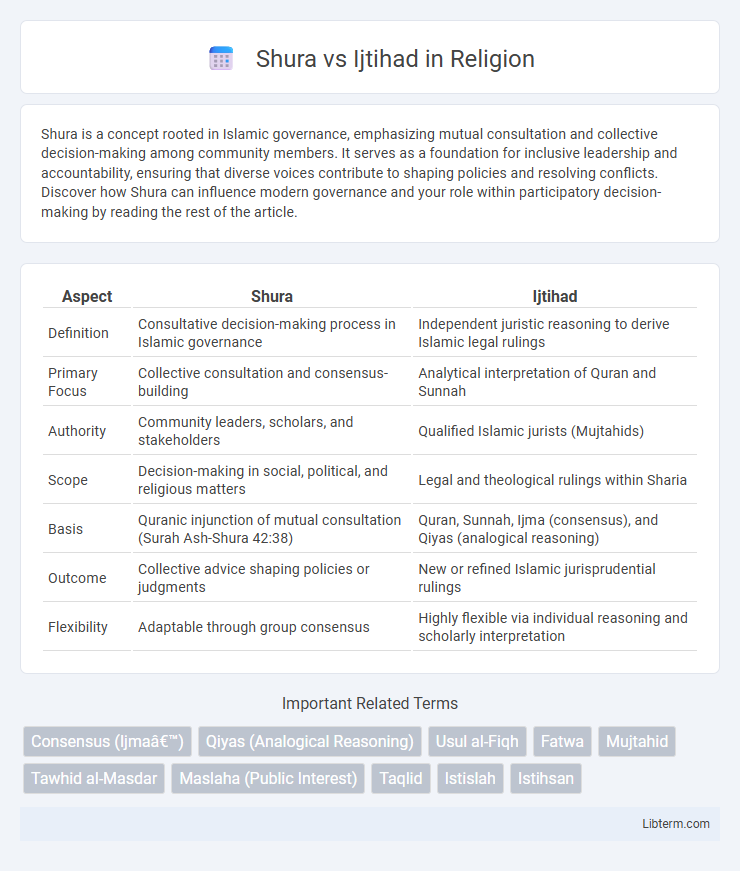Shura is a concept rooted in Islamic governance, emphasizing mutual consultation and collective decision-making among community members. It serves as a foundation for inclusive leadership and accountability, ensuring that diverse voices contribute to shaping policies and resolving conflicts. Discover how Shura can influence modern governance and your role within participatory decision-making by reading the rest of the article.
Table of Comparison
| Aspect | Shura | Ijtihad |
|---|---|---|
| Definition | Consultative decision-making process in Islamic governance | Independent juristic reasoning to derive Islamic legal rulings |
| Primary Focus | Collective consultation and consensus-building | Analytical interpretation of Quran and Sunnah |
| Authority | Community leaders, scholars, and stakeholders | Qualified Islamic jurists (Mujtahids) |
| Scope | Decision-making in social, political, and religious matters | Legal and theological rulings within Sharia |
| Basis | Quranic injunction of mutual consultation (Surah Ash-Shura 42:38) | Quran, Sunnah, Ijma (consensus), and Qiyas (analogical reasoning) |
| Outcome | Collective advice shaping policies or judgments | New or refined Islamic jurisprudential rulings |
| Flexibility | Adaptable through group consensus | Highly flexible via individual reasoning and scholarly interpretation |
Understanding Shura: Definition and Origins
Shura, an Arabic term meaning consultation, is a foundational principle in Islamic governance and decision-making derived from the Quran and Sunnah. Rooted in the practices of the Prophet Muhammad and early Islamic community, Shura emphasizes collective deliberation and mutual consent among knowledgeable members. Its origin reflects a system aimed at fostering inclusivity and wisdom in addressing communal and political issues.
Ijtihad Explained: Concept and Historical Development
Ijtihad refers to the Islamic legal principle of independent reasoning used by qualified scholars to interpret the Qur'an and Hadith when explicit texts are unavailable. Historically, ijtihad emerged during the early Islamic period to address new legal and social issues, evolving through major Islamic schools of thought. Its application has been crucial in adapting Islamic jurisprudence to changing contexts while maintaining fidelity to foundational texts.
Foundational Differences Between Shura and Ijtihad
Shura, rooted in Quranic injunctions, represents collective consultation among qualified members of the Muslim community to achieve consensus, emphasizing communal decision-making and unity. Ijtihad involves independent reasoning by qualified Islamic jurists (mujtahids) to interpret divine law in new or complex situations, focusing on adaptability and individual scholarly judgment. The foundational difference lies in Shura's collective deliberation process based on consensus, while Ijtihad prioritizes individual juristic authority to derive rulings from primary sources like the Quran and Sunnah.
The Role of Shura in Islamic Governance
Shura, an essential principle in Islamic governance, ensures collective decision-making by involving knowledgeable community members, promoting justice and consultation in leadership. Unlike Ijtihad, which grants individual jurists authority to derive legal rulings based on independent reasoning, Shura emphasizes consensus and communal input to guide political and social affairs. This collaborative process strengthens governance legitimacy and accountability within Islamic frameworks.
Ijtihad in Islamic Jurisprudence
Ijtihad in Islamic jurisprudence refers to the independent reasoning used by qualified scholars to derive legal rulings when explicit texts from the Quran and Hadith are not available. It plays a critical role in adapting Islamic law to new circumstances by interpreting foundational sources with scholarly insight. Unlike Shura, which emphasizes consultative decision-making, Ijtihad centers on individual scholarly authority and expertise in Islamic legal principles.
Key Principles Guiding Shura and Ijtihad Processes
Shura is guided by collective consultation, consensus, and the inclusion of knowledgeable community members to ensure decisions reflect the broader Muslim community's welfare. Ijtihad centers on independent reasoning by qualified scholars who interpret primary Islamic sources, especially when explicit texts are absent or ambiguous. Both processes uphold adherence to the Quran and Sunnah while balancing traditional jurisprudence with contextual adaptation.
Historical Examples of Shura and Ijtihad in Practice
Historical examples of Shura include the Rashidun Caliphate, where Caliphs Abu Bakr and Umar regularly consulted councils for governance decisions, exemplifying collective decision-making. Ijtihad was prominently exercised by scholars like Imam Abu Hanifa and Imam Malik, who utilized independent legal reasoning to adapt Islamic law in varying socio-political contexts. Both Shura and Ijtihad showcase dynamic mechanisms within Islamic tradition to address evolving community needs.
Contemporary Challenges: Shura vs Ijtihad
Contemporary challenges in Islamic jurisprudence highlight the nuanced distinction between Shura, a consultative process rooted in collective decision-making, and Ijtihad, the independent exertion of legal reasoning by qualified scholars. While Shura emphasizes consensus and communal input to address modern societal issues, Ijtihad allows for dynamic interpretation of Sharia in response to changing contexts. Balancing these approaches remains critical for resolving legal and ethical dilemmas in contemporary Muslim communities.
Impacts of Shura and Ijtihad on Modern Muslim Societies
Shura, as a consultative decision-making process, fosters collective leadership and community participation in governance, enhancing social cohesion and political stability in modern Muslim societies. Ijtihad empowers contemporary scholars to interpret Islamic law in response to new challenges, promoting legal flexibility and adaptability within diverse cultural and technological contexts. Together, Shura and Ijtihad contribute to the evolution of Islam by balancing tradition with innovation, influencing modern jurisprudence, governance, and societal reform.
Future Prospects: Harmonizing Shura and Ijtihad
Future prospects for harmonizing Shura and Ijtihad lie in integrating consultative decision-making with independent reasoning to address complex modern challenges. Emphasizing digital platforms and collaborative frameworks can enhance collective wisdom while respecting traditional jurisprudence. This synergy fosters dynamic, context-sensitive Islamic governance adaptable to evolving societal needs.
Shura Infographic

 libterm.com
libterm.com